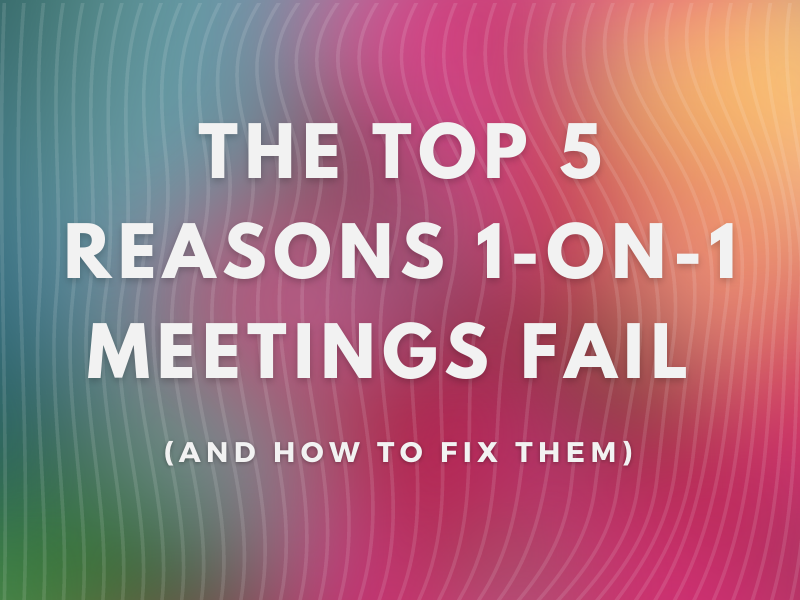Treat mistakes as learning opportunities and show vulnerability
One problem when trying to build trust as manager is that demonstrating your competence can easily come across as demonstrating another person’s incompetence even if that wasn’t your intention at all.
Are you accountable for your team members’ performance?
Of course.
Does that mean you need to correct every little mistake that they make?
Not at all.
Don’t be the manager who asks the designer to change the color of a website button or makes spurious edits in the content writer’s copy to achieve a marginal improvement that most likely only you can see. Don’t be the manager who holds people accountable to expectations that have never been clearly articulated. And most importantly, don’t be the manager whose first impulse is to assign blame when some things inevitably go wrong.
Sure, if a mistake is likely to have high impact or high visibility, correct it. If there is serious under-performance or toxic behavior, address it promptly. If someone needs to improve a skill, help them. But if someone is generally meeting expectations, or a piece of work is good enough, resist the temptation to compulsively demonstrate your competence by showing how it could have been even better.
Why?
Because if you want to build an effective team, you need to prioritize ownership over optimum.
As now famous research by Amy Edmondson at Harvard University has shown, teams are more effective when leaders create a learning-oriented (as opposed to blame-oriented) culture, a climate in which mistakes can be discussed, corrected, and learnt from openly, without fear of being shamed or punished.
“Project Aristotle,” Google’s own research into what makes teams effective, has reinforced these findings by showing that psychological safety, as defined by Amy Edmondson, is the most important contributor to team effectiveness.
According to Edmondson, a psychologically safe team is one where:
-
Mistakes aren’t held against people.
-
Team members are able to bring up problems and tough issues.
-
People on the team don’t reject others for being different.
-
People feel safe to take risks.
-
People feel safe to ask others for help.
-
People don’t deliberately act in ways that undermine each other’s efforts.
-
People’s unique skills and talents are valued and utilized.
One way you can encourage people to grow by learning from mistakes, taking risks, and trying new approaches is to make them feel safe by showing vulnerability. Show them your humanity in its full fallible glory by talking openly about your toughest challenges. Tell them about some of the worst mistakes you’ve made. When you feel uncertain or don’t have the answer, admit it. Ask for help when you need it. Admit and apologize if you’ve done something wrong. And take the blame if someone on your team has messed something up.
After all, the buck stops with you.
Make constructive dissent safe and practice nemawashi
Here’s a scenario that’ll be familiar to most of you:

The irony is that as soon as we become managers, we’re liable to forget how we felt—and feel—when our own managers propose something we disagree with or feel concerned about. You might have the best intentions and the most psychologically safe team out there, but disagreeing with someone more powerful is always risky for people.
Even if you’ve built a culture where people do feel safe voicing their dissent, they’ll often—consciously or not—attempt to reduce that risk through mitigated speech, downplaying or sugar-coating their opinions because they may be unsure if they’re right, how their point will be received, or simply trying to be polite.
Why is that a problem?
First, because it puts you at risk of authority bias (the tendency to attribute greater accuracy to the opinion of an authority figure) and groupthink (the desire for conformity in a group that can often lead to suppressing dissenting viewpoints). And secondly, because implementation will often break down when your team members give you counterfeit buy-in to play it safe but have little motivation to actually follow through.
So what can you do to make constructive dissent safe for team members?
The following have worked well for me over the years:
-
Speak last in meetings
Even—and especially—if you have a strong opinion about something and know exactly what needs to be done, resist the temptation to be the first to speak in meetings. If you come out with a strong opinion forcefully, you make it exponentially riskier for your team members to voice different perspectives. Rather, ask your team members what they think first. If you notice that someone is silent, ask them to contribute.
-
Ask for constructive upward feedback
As big a problem as it is when managers don’t give their team enough positive and constructive feedback, an even bigger one is that most managers don’t get much feedback—particularly constructive feedback—themselves. To avoid living in an echo chamber where your ideas, plans, and decisions aren’t sufficiently stress-tested, solicit constructive feedback from your team members frequently by asking them questions such as: “What risks do you see?” “What is one thing I may be missing here?” “What is one thing you’d like me to do differently, but you’re afraid I might get upset if you told me about it?”
-
Align on a shared way to voice concerns
Aim to make voicing dissent a duty, rather than a privilege. Make it clear that you expect team members to voice their opinions, especially when they disagree with you or someone else. And align on a shared way to voice concerns with your team. One such way that has been adopted at a number of companies is nonviolent communication, a four-step approach that you can read more about here.
-
Practice nemawashi
Nemawashi is a Japanese word. Its literal meaning is “turning the roots,” but it’s often translated as “laying the groundwork.” In the corporate world, it means approaching and consulting with stakeholders individually before a decision is made to gauge their reaction and gather their input. While I’ve adopted this practice as a manager in Japan, it’s served me well and become my default approach when leading teams in Germany and Hungary as well. As opposed to the illustration at the beginning of this chapter, nemawashi looks something like this:

In other words, before finalizing and announcing a plan or a decision, you approach the important stakeholders one by one with a draft proposal to solicit their feedback.
If you’re concerned that this approach slows down decision-making, it does indeed.
However, I’ve found that it often leads to better decisions, more trust on the team and across teams, and much faster and smoother implementation down the line.
Of course, there aren’t enough hours in the day to make every decision this way. If a decision is low-risk, reversible, clearly within your purview to make, and has low impact on the current or future day-to-day of your stakeholders, you can make a quick decision without consulting too many people in advance, and review it periodically to course correct if needed.
But if a decision is high-risk or difficult to reverse without incurring significant costs, it has a tangible impact on some of your stakeholders’ day-to-day, or it’s ambiguous who has the authority to decide, I’ve found nemawashi to be the best approach.









